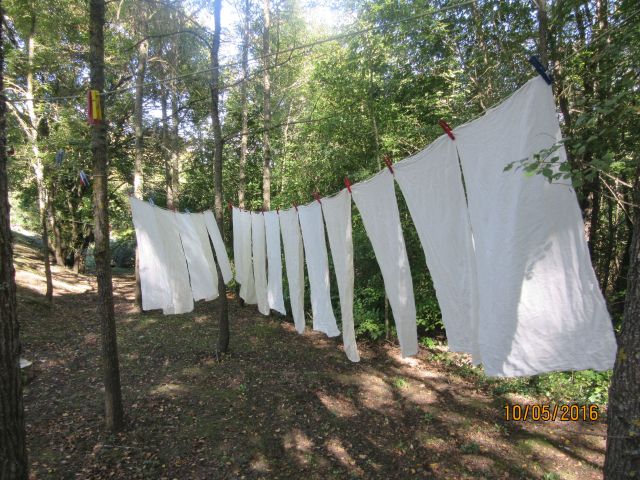77-year old hidden damask hand towels finally hit the laundry line for the first time!

Seventy-seven years ago, in 1939, back when this story begins, my German grandparents were the proprietors of a country store named “Kaufhaus Angeln,” which offered groceries, school supplies, shoes, dishes, cigarettes and cigars, garden tools, hats, candy, bales of cloth and bed and table linens to the residents of Sterup, a village in the small triangular-shaped region of Angeln in Schleswig Holstein, and the farmers of the surrounding farmsteads. Angeln skirts the south-western shores of the Baltic Sea just below the Danish border and is the ancestral homeland of the “Anglo” part of the Anglo-Saxons.
My grandparents, Hugo and Lilly Boerger, who were actually from the “Alte Land” area east of Hamburg, bought Kaufhaus Angeln in 1919, the year in which they got married, and moved to Sterup. Both worked hard, and the store was successful during the years that Sterup was still a vibrant economic center of the surrounding agricultural community. During my childhood back in the fifties and early sixties, farmers pulled up in horse-drawn wagons on the big square that separated the “Kaufhaus” from the tall oak trees of the church yard. After store hours, on long and sunny summer evenings, my parents, my aunt and their neighbor friends would play Badminton on that square; and during my teenage years, the store’s front steps on the square were the place where my friends and I hung out.
My grandparents had three children. Back in September 1939, Ilse (my mother) was nineteen years old, Hans-Juergen was fifteen, and Ingrid eight. Almost six devastating war years later, in August 1945, my uncle Hans-Juergen, clothed in his damp uniform and hulled in an equally damp carpet for warmth, would die of pneumonia just days before his parents could reach him at his camp in Westfalia; in 1947, my mother would marry an Austrian man and move to Vienna; and aunt Ingrid would be left to manage the store until it closed on New Year’s Eve 1975, and later, to care for her aging parents. “Opa Sterup” passed on in December 1980 at age 95, and “Oma Sterup” followed him in January 1984 at age 88.
In 1939, though, hard times were looming. Hitler’s German army marched into Poland on September 1, and my grandmother knew that stocking my mother’s and my aunt’s dowries with appropriate linens would become difficult if the war raged on, as it did. Therefore, without my grandfather’s knowledge, she secured portions of bales of linen damask and hand towels and buried them under blankets and comforters in a large, decoratively painted dowry chest that she in turn had inherited from her great grandmother.
And there they lay until last week. Terry and I visited Aunt Ingrid, now 85, during the first week of October of this year. Ingrid, who never got around to marrying and had no use for a dowry of linens, walked over to the “Kaufhaus Angeln,” now occupied by a dentist and her husband, where the old dowry chest still stands as it was too large for Ingrid’s much smaller house next door, and rummaged underneath the blankets and comforters. When she pulled out the linens from under them, the patterns of the damask were still glistening in their old splendor. “Do you want to have them?” she asked. I was thrilled when Aunt Ingrid regaled me with these beautiful old, unfinished pieces of cloth and about a dozen finished hand towels. A couple of days later, after traveling by plane from Hamburg to Florence, I brought them here to Calboccia, and washed them the next day. Now I am watching them, suspended from the laundry lines in our “bosco,’” sway in the breezes of Monte Calboccia. I am not sure whose dowry they supplement now – mine or that of my daughters, but it doesn’t matter. They are out in the open to be enjoyed.

You must be logged in to post a comment.